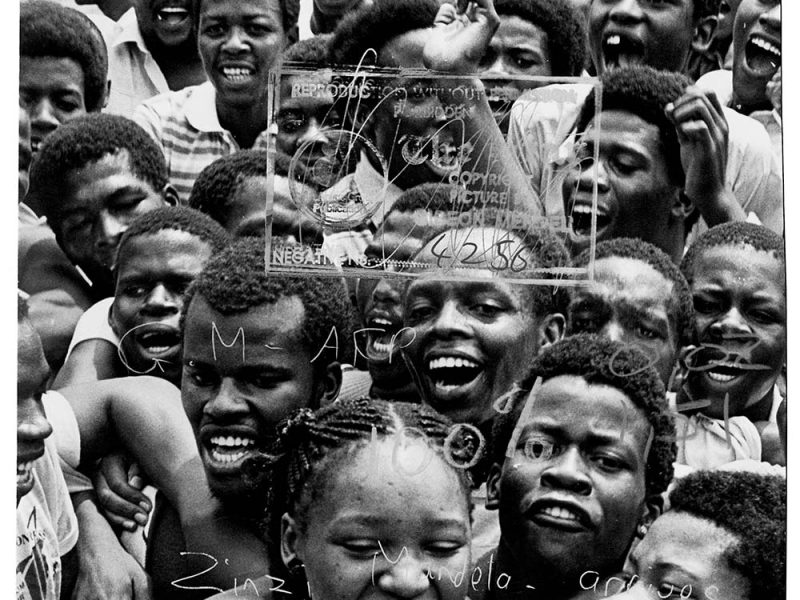Gideon Mendel
Artist Statement
In the 1980s I was part of a young generation of ‘struggle photographers’ documenting the political mobilisation of that period. I witnessed violent repression by the state and many funerals of young black township activists. Though I was for some of this time employed as a news photographer, the circumstances did not allow for objectivity. The images I made were partisan and framed against the background of the immense suffering of black people under apartheid. In recent years, in a process of reassessing my archive from this period the physical materiality of the text, markings and stamps on the backs of my prints have increasingly captivated me. O they somehow reflect on the relationship between photography and history? I decided to precisely merge the front and reverse of these to create a superimposed combination of image, word and markings. All the information, normally hidden on the back of the print, becomes merged with the actual image, now in full view. Many of these photographs were published in newspapers, the original prints showing a variety of crop marks on their reverse sides, and were made in the pre-digital era when contextual information was on the back of the prints. Some have my handwritten captions. Others have agency copyright labels along with detailed information about the photographs from my time with the AFP, Magnum Photos and Network agencies. Making this intervention now is for me a way of foregrounding photography’s role in producing the past. I believe that printing these works with the collotype method would bring a new dimension of meaning to them reflecting on how the past we learn or see is not given or static. It must be built up. So we would be rendering the making of history, palpable, quite literally, on the surface of the image.
Bio
Gideon Mendel’s intimate style of image-making and long-term commitment to socially engaged projects has earned international recognition. Born in Johannesburg in 1959, Mendel began his career as a news and ‘struggle’ photographer documenting the final years of apartheid in South Africa. This experience marked him deeply, and much of his subsequent work has been engaged with the key issues facing his generation. In 1991 he moved to London, and continued to respond to global concerns, especially HIV/AIDS. Since 2007, using stills and video, Mendel has been developing a variety of narrative threads in response to our global climate emergency. For many years his main focus was Drowning World, an art and advocacy project about flooding. This work has been seen in many publications including National Geographic, Geo and the Guardian Magazine. Along with this his images have been used in many climate protests, while his photographs and video pieces are increasingly seen in a variety of gallery and museum contexts. More recently Mendel has extended his work about climate change to incorporate the element of fire with the Burning World project. He has received the inaugural Jackson Pollock Prize for Creativity and the Greenpeace Photo Award. Shortlisted for the Prix Pictet in 2015 and 2019, he has also received the Eugene Smith Award for Humanistic Photography, the Amnesty International Media Award, and six World Press awards.
Honourable Mention
Series Title
Merged
Website
Category
Hariban Award 2021

